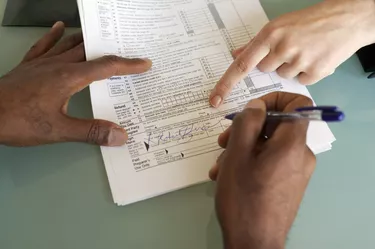
The rules for claiming business travel changed with the passage of the Tax Cut and Jobs Act, which went into effect on January 1, 2018. Whether or not you can claim mileage depends on a variety of factors, including your employment status, the purpose of the trip and where you're going. Reviewing the guidelines for claiming mileage to work as a tax deduction will help you make sure you don't have your tax return rejected or delayed, which can result in a late penalty.
Video of the Day
Video of the Day
What Happened in 2018?
When the Tax Cut and Jobs Act went into effect, it eliminated the mileage deduction for employees who traveled on behalf of their employers but were not reimbursed by their employers. This was true of all unreimbursed business expenses.
Through at least 2025 (depending on whether or not the TCJA is renewed), only self-employed workers, freelancers, sole proprietors, gig workers or small-business owners can claim the mileage deduction – if your mileage qualifies. If you have filed a W-4 and get a W-2, you are an employee and can't claim mileage.
Mileage to Work Rules
Even if you are a contractor, if you drive to and from the same client each day to conduct your work, you can't claim that mileage as business travel – it's a commute. For example, if you are a contract baker for a grocery store and go to the store each morning or three days per week to bake bread for them, that's considered a commute.
If you are a baker who fills in for other bakers, or who has several clients and you do not have a regular work schedule, you can claim that mileage. For example, you might make pastries for the same banquet hall when they have events, make wedding cakes for a particular bakery when they have special orders or bake bread for one or more restaurants now and then. That's not commuting.
Talk to a tax professional to make sure your mileage claim is likely to be accepted.
Consider Also: Tax Deductions for Business Travel Expenses: What You Need to Know
What About a Second Job?
If you are an employee and have a second job or side hustle, you might be able to claim the mileage for your second job. This is true of ride-share drivers who work for companies like Uber and Lyft, explains the gig-worker website Stride.com. This is also true for food-delivery drivers, such as those who work for DoorDash, according to Ridester.com.
Claim Your Miles Correctly
In order to claim the mileage deduction, you must track your miles. The IRS doesn't allow you to go back and estimate your miles each month or at the end of the year. If you do and you're audited, your claims will probably be rejected. Keep a notebook or other method to write your miles and the purpose of your travel.
Once you claim your mileage deduction (56 cents per mile for 2021 and 58.5 cents for 2022), you can't claim other expenses to operate, maintain or pay for your vehicle. That means you can't also deduct gas, oil, air filter changes, tires, maintenance, repairs and your lease or loan payment.